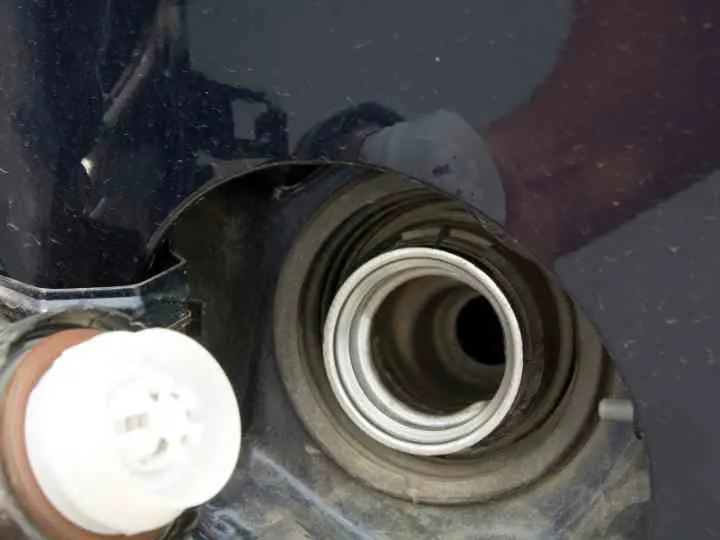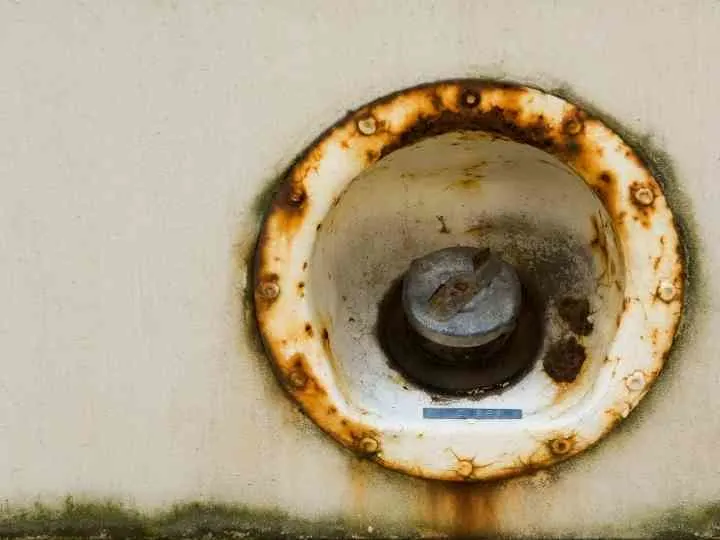You may have misplaced your vehicle’s gas cap during your travels or while working on it in the garage. Or you’re seeing the gas cap/ check engine light indicating that there’s a fault with your gas cap or it’s missing entirely.
If you’re in a position whereby you can’t get a new gas cap to replace the lost one, you don’t need to panic.
It’s safe to drive a vehicle without a gas cap. Fuel tanks have a flapper valve that stops gas from spilling out of the vehicle even when it’s missing the gas cap. However, driving without a gas cap will lower your vehicle’s fuel efficiency in the long run and is therefore not recommendable.
Today’s article looks into gas caps, their importance, and whether driving a car without a gas cap is a traffic offense. Read on to find out more.
Is Driving a Vehicle Without a Gas Cap Illegal?
Whether driving a vehicle without a gas cap is legal or not depends on your state laws. Some states are against driving without a gas cap for environmental conservation reasons. Gas vapors can leak through the flapper valve when the gas cap is missing.
One such state that is against capless driving is Arizona.
Arizona fuel tank caps law 28-965 states that “A person shall not operate a motor vehicle on a highway unless the filling spout for the fuel tank is properly closed by means of a cap or cover composed of a non-combustible material that meets or exceeds applicable federal safety standards.
This section does not apply to an electrically powered motor vehicle.”
The second state is Wisconsin, whereby all drivers are expected to comply with the fuel systems code.
Among other regulations, the code states that “The fuel tank shall be closed with a fitted metal or plastic cap and shall be rigidly attached to the vehicle.”
It may be legal in some states to drive without gas, while in others, it’s illegal.
Missing a gas cap is an offense based on articulable grounds or reasonable suspicion. Additionally, being pulled over for lacking a gas cap is quite rare, but the officer can book you if your driving is deemed to endanger other road users.
It can be an additional charge if you fail sobriety tests or you’ve committed a traffic offense.

Is a Gas Cap Important?
Driving without a gas cap will not have catastrophic effects on your car but will lower its performance.
So, if you can drive without a gas cap, is it really necessary to have it in place?
Yes, here’s why
Safety
Driving without a gas cap will attract crooks to siphon fuel from your vehicle’s tank. The gas cap provides the extra security to ensure that your gas tank isn’t easily accessible.
Furthermore, a good gas cap should be air-tight, fitting well, and has flexible rubber seals secured in place.
If these requirements aren’t met, your vehicle will spill fuel on the road in the case of an accident or if it rolls.
Fuel Efficiency
Gas tanks help maintain a good fuel pressure that allows the vehicle to be fuel-efficient.
Also, it prevents gaseous fumes from leaking out of the tank and water from entering into the tank.
Water and debris damage the car’s drivetrain components. Having debris-free fuel keeps your vehicle in good and productive working condition.
Is Riding a Motorcycle Without a Gas Cap Dangerous?
As much as you can drive your vehicle without a gas cap, you can’t do the same for a motorcycle. Most motorcycles don’t have flapper valves in their fuel tanks that might prevent any spillage.
Therefore, riding without a gas cap increases the chances of fuel spillages tremendously. If the fuel comes into contact with the spark plugs or hot surfaces such as the engine or the exhaust, your bike will burst up in flames.
But that’s not to mean that you should immediately dump your bike if you misplace the gas cap. A good approach is to cover the tank with a non-combustible material for the remainder of your journey.
It’ll prevent debris from getting into the gas tank and fuel from spilling out on the bike, the road, or on your clothes.
You’ll also have to ride safely and at low speeds to lower the chances of fuel spillages. Once you’re in a safe location, consider replacing the gas cap as soon as you can.
Can Driving Without the Gas Cap Cause the Check Engine Light to Come On?

The check engine light might come on for a myriad of reasons that it can be a little bit difficult to pinpoint the exact cause of the warning or how serious the issue is.
And, driving without your vehicle’s gas cap is one very common reason for the check engine light notification. Maybe you went to fuel and didn’t close the gas cap well, or it’s missing.
Actually, if you’ve been ignoring the check engine light, it might take you till the next refueling stop to discover that you have a faulty or missing gas cap.
And, if your check engine light persists after several days of driving, your vehicle might be having a massive problem.
Here are other reasons your check engine light comes on
Faulty Spark Plugs
Spark plugs ignite the fuel in a vehicle’s combustion chamber.
A check engine light can indicate that the spark plugs, spark plug wires, or the ignition coil are faulty and may need immediate repair or replacement.
Failure to do so clogs your vehicle’s catalytic converter and may damage the ignition coils.
Faulty Oxygen Sensor
An oxygen sensor detects the amount of oxygen exiting your car through the exhaust pipes to determine the engine’s air-to-fuel ratio efficiency.
A malfunctioning oxygen sensor negatively impacts your engine’s combustion intervals, timing, and fuel economy.
If your vehicle’s check engine light comes on, but your gas cap is in place, then look out for the following faulty oxygen sensor symptoms.
- Poor fuel economy
- Rough idling
- Failed emissions test
- Poor engine performance
In addition to improving your vehicle’s performance, replacing the oxygen sensor will save spark plugs and catalytic converters.
Faulty Catalytic Converter
After years of service, the catalytic converters will get clogged, contaminated, or physically damaged, causing a reduction in your vehicle’s performance.
Look out for the following symptoms to differentiate a faulty gas cap from missing or damaged catalytic converters.
- Slower acceleration
- Dark exhaust gasses
- The smell of rotten eggs from the exhaust
- Weaker engine performance
- Overheating underneath the vehicle
The symptoms above don’t exclusively mean that your vehicle is missing or has a bad catalytic converter. Consult a mechanic to diagnose the specific problem for you before settling on replacing the converter.
Conclusion
A gas cap is a crucial part of the car that helps keep the fuel safe and clean. If you’ve recently lost or misplaced yours, there’s no issue with driving without one.
However, consider replacing it as soon as possible with a similar model.
For bikers, never ride on a motorcycle that’s missing a gas cap for your safety. Never put yourself in a position that endangers your life and other road users.
